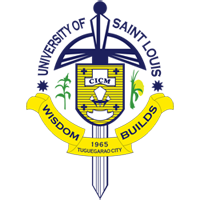
With the theme “Re-kindling and Re-living Ethnicity in USL, the University of Saint Louis (USL) commemorated ethnicity and indigenousness through the Louisian Ethnicity Week on Jan. 29-31.
The Ethnicity Week was inspired with the objectives to provide an opportunity to deepen understanding of the values and culture to learn to live together; to respond to the Church’s celebration in this Year of Ecumenism, Interreligious Dialogue and Indigenous Peoples; to respond to the Commission on Higher Education’s (CHED) memo number 2 series of 2019 on the integration of Indigenous Peoples’ (IP) Studies/Education into higher education curriculum; to uphold CICM values; and to identity indigenous peoples’ concerns.
The celebration started with a Mass presided by Rev. Fr. Renillo H. Sta Ana, CICM, University president, and organized by the Campus Ministry group.
“Rather than be divided, we should come together and dialogue and become better persons, better group, and better society,” Fr. Sta. Ana, who is also the officer-in-charge to the Office of the VP for Mission and Identity, said in his homily.
“As we celebrate our Ethnicity Day, let us bring our differences together and with our differences, how we can make our Louisian community a better community – a community which is united and recognizes that God is our Lord and we are all His children, a Louisian community united with all the different talents and skills, community united willing to serve one another, and willing and ready to serve especially the poor and the little ones.”
 Ethnicity Exhibit
Ethnicity Exhibit
After the Mass was the opening of the exhibit showcasing the different cultural groups at the Wenceslao Padilla Mission and Learning Hall.
Spectators and visitors were from National Commission on Culture and Arts (NCCA), presenters in the 2nd International Research Conference on Local Knowledge and Indigenous Studies, and USL faculty and staff.

The exhibit included the Ybanag culture whose representation was set up by the Elementary department, Malaueg by the Junior High School, Itawes by the Senior High School, Iloko by the School of Accountancy, Business and Hospitality (SABH), Aeta by the School of Education, Arts and Sciences (SEAS), Kalinga by the School of Engineering, Architecture and Information Technology Education (SEAITE), Tagalog by the School of Health and Allied Sciences (SHAS), Ivatan by the Graduate School, and Apayao by the Non-Teaching Personnel (NTP).
Meanwhile, as the Congregation of the Immaculate Heart of Mary (CICM) has an advocacy on Indigenous Peoples’ welfare, an exhibit on CICM Advocacies was put up by the University Libraries.
The entire exhibit ran from Jan. 29-31.
The Ethnicity Night showcasing multicultural and diverse talents among Louisians was staged on Jan. 29.
International conference
Still part of the Ethnicity Week celebration, the 2nd International Research Conference on Local Knowledge and Indigenous Studies was held on Jan. 29-31.
The said conference gathered scholars and educators who are into research on local knowledge and indigenous and cultural studies.
Among other specific aims, the event served to build linkages among institutions, scholars and local knowledge enthusiasts in the Philippines and in the world in the promotion of local knowledge and indigenous studies as an “important tool in achieving sustainable development in a multicultural world.”
A total of 52 studies were presented at the conference, which was divided into plenary sessions.
Plenary speakers were: Dr. Shirley N. Dita of the Department of English and Applied Linguistics of De la Salle University; Rev. Fr. Ferdinand T. Maguigad of the College of Liberal Arts and Institute of Graduate Studies of the Lyceum of Aparri; Director Julieta M. Paras of CHED Region 2; Mr. Benjie De Yro of The Northern Forum; Vice Mayor Joel Ruma of Rizal, Cagayan; and Deandre Wirdana Saroinsong of Green School in Bali, Indonesia.

USL’s Center for Social Innovation, Local Knowledge and Educational Research (CSILKER) and the University Research and Development Center (URDC) organized the conference.
Conference partners were CHED; the Department of Education; International Multicultural Network; Provincial Government of Cagayan; and the City Government of Tuguegarao.

